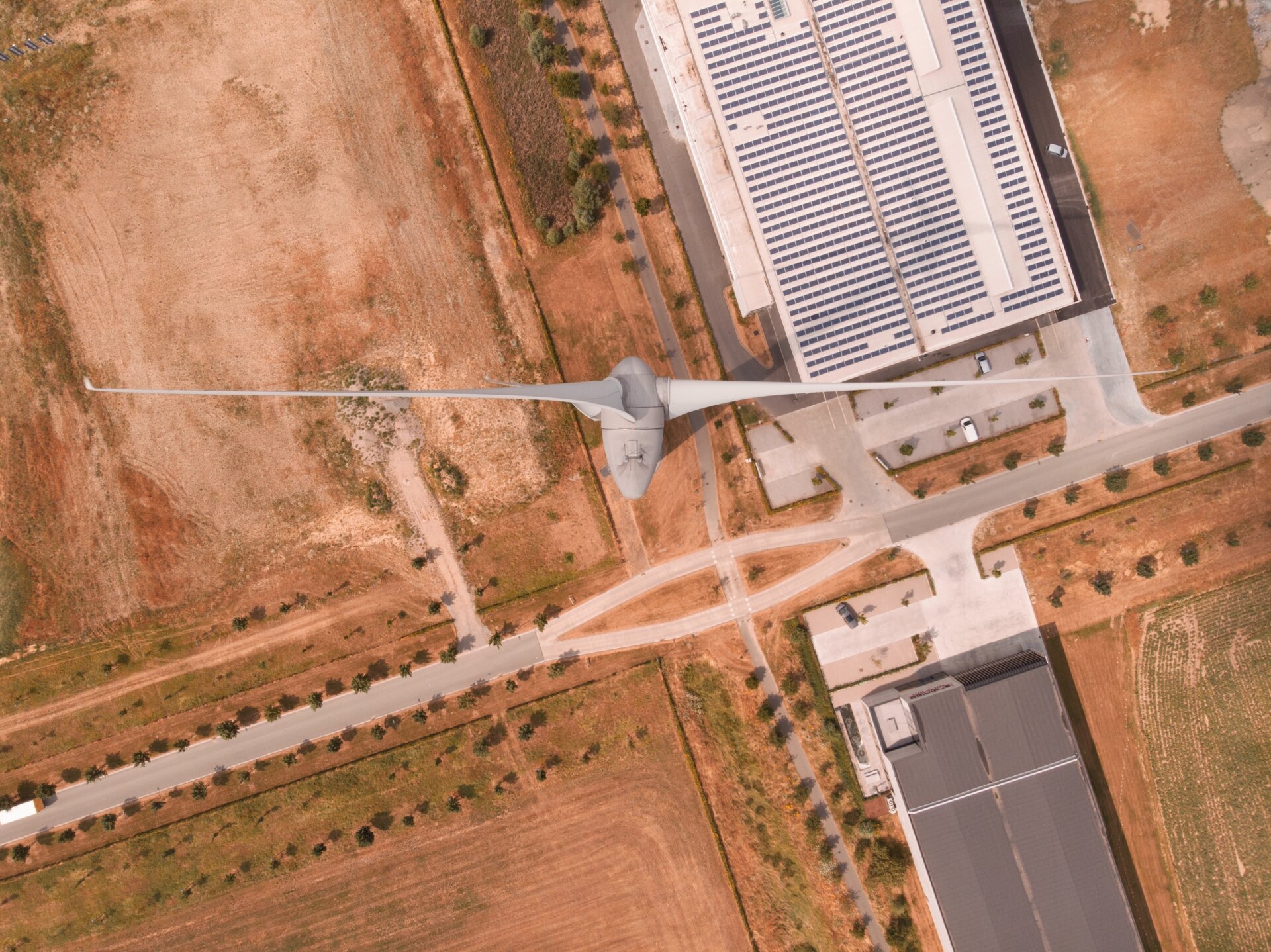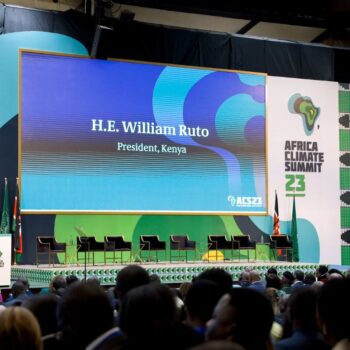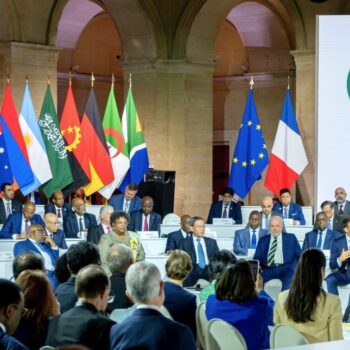Recent discussions show a welcome realisation that Europe needs to act faster, and more boldly, to transition to a prosperous and fair net zero economy. Making that a reality requires a different way of doing politics. Energy policy debates have been dominated by incumbent industries for too long. Policymakers must reach out and include new voices – citizens, consumers, and companies providing new solutions – to plan a transition that restores Europe’s position as a clean technology leader while maintaining social cohesion.
Europe is realising that slow isn’t safe in the clean transition
The heads of the European Central Bank, European Investment Bank and International Energy Agency have just co-hosted an unprecedented meeting to discuss how the continent can survive and thrive through the net zero transition. A decade ago, it would have been unthinkable that these organisations would jointly convene European energy ministers, top bankers and clean technology CEOs to discuss action on climate change. But with global clean technology investment outstripping that into fossil production in 2022, and growing at 30% annually, the inevitability and impact of the clean transition is something no-one can ignore.
Predictably for a European economic debate this event was framed rather defensively. Concerns that the EU has fallen behind the US and China in attracting investment, deploying clean technology, and achieving competitiveness in future markets, were a driving factor. There were also echoes of past European debates which too often focused on the EU’s weaknesses rather than its unique strengths and assets.
This time the debate was much more constructive and optimistic about Europe’s ability to respond. The, perhaps surprising, sense of agency rests on four powerful pillars:
- The ability of Europe to make fast and hard political decisions to lower dependence on Russian gas.
- The scale of cheap European renewable energy resources from offshore wind and solar.
- The depth of European technology and research leadership in many clean technology sectors; nurtured by decades of leadership in climate policy.
- The strength of the European single market and continental power grid to provide the scale and blend of incentives needed to support new products and solutions.
There was also an emergent consensus on what needs to be done. A renewed focus on European-wide industrial policy. Rapid finalisation of critical energy market legislation. Speeding up planning consent processes; especially for new power grids. Leveraging under-used European savings to improve access to finance for all types of productive and infrastructure investments; including through Christine Lagarde’s vision for a Green Capital Markets Union. Together these measures would create the demand pull & financing depth necessary to attract global investment & accelerate green technology business growth.
This welcome convergence on an action agenda shows the beginning of a realisation that going slow is no longer safe. Europe needs to make bolder and faster decisions in the new technological and geopolitical context to secure a safe and prosperous future.
Learning from past mistakes to choose the right way forward
So far so good. But how will these new decisions avoid the economic mistakes of the past and build robust public support for this future? To build an effective industrial strategy Europe will need to make clear choices between different technologies and alternative infrastructure networks. China has focused on frontier markets where there are few established international competitors or domestic incumbents to disadvantage. The realities of US fossil fuel politics means it is following an expensive “all of the above” strategy, which is probably unaffordable for anyone else, while directing investment into disadvantaged areas and communities to solidify public support.
Europe will need to decide how it balances electrification and use of zero carbon hydrogen to avoid wasteful duplication of grids and pipelines. The EU needs to have a realistic approach to potential scale of green hydrogen imports which many producer countries are looking to use to power domestic clean industries. Decision makers need to make a hard-headed assessment of the most valuable uses for scarce European carbon storage and likely deployment rates for CCUS given its consistent under delivery over the last two decades. Europe needs to ensure there are credible benefits of transition across the continent and consumers feel the upfront costs are being shared fairly.
There are no right answers in this uncertain world. Europe needs to be able to reliably, efficiently and fairly transition under all plausible technological and geopolitical scenarios. This will require clear goals, rigorous analysis, transparently assessed options and balanced advice from all stakeholders.
But this is not the history of European energy policy. Europe made major strategic mistakes in failing to reduce its demand for, and dependence on, Russian gas despite supply being politically weaponised since 2002. Cheered on by the gas industry, EU member states repeatedly refused to agree cost-effective gas demand reduction measures over the last two decades. This assertion of national energy discretion resulted in huge continental costs.
European consumers supported growth in global clean technology markets through subsidies and regulation, but European companies assumed this would guarantee their continued global competitiveness. Decision makers didn’t respond to the fact that Chinese five-year-plans since 2011 had clearly signalled an intent to overtake the EU in electric vehicles and renewables. Many in the EU were relaxed about relying on low-cost Chinese manufacturing in key sectors and assumed Europe would still capture the high-value added parts of supply chains in technology, design and branding. The Biden administration’s core political and economic strategy of massive support for clean technology manufacturing has been clear since 2019.
Even when faced with this inevitable rise in geopolitical competition many European companies continued to lobby against strong renewable and vehicle emissions targets which would have supported European industry. Some European car makers even concentrated their electric vehicle R&D in the Chinese market due to its strong electric vehicle mandates.
Public support for climate action is a key macroeconomic asset
Europe has built broad public support for its climate policies backed by vibrant civil society and unique social movements. This consensus has survived and strengthened through the global financial crisis, COVID-19 and Russia’s Ukraine invasion. The political and policy certainty it provides has reduced risks and investment costs and made Europe a preferred destination for new clean investment, at least until the impact of US Inflation Reduction Act subsidies.
Continued public support is one of Europe’s key macroeconomic assets but it cannot be taken for granted. As decarbonisation deepens to impact citizens’ everyday lives, climate action is increasingly being weaponised for short-term political gain. From German boiler bans to grid planning and UK petrol car phase-out, measures to accelerate clean technology deployment are facing backlash across Europe. Some of this damage has been self-inflicted by a failure to consider the immediate costs to cash-strapped households. This has handed opponents and incumbent industries easy opportunities to inflict political damage, despite the huge potential distributional dividends from transition. Shifting away from fossil fuels will lower energy costs to consumers and gradually release over €400bn a year in spending on fossil imports for investment into the European economy.
Social strains will only multiply. Climate damages are already hitting Europe hard but unequally, with southern states and rural areas facing the brunt of early damage. Slovenia experienced damages from extreme floods costing 7% of GDP in 2023. There is only a patchy “social contract” within and between EU states on who will pay to protect citizens and help economies recover from extreme events.
The European Green Deal in 2019 anticipated the need to put social issues at the heart of the net zero transition. Unfortunately it depended mainly on EU member states to implement policies in a fair way with the EU only having small additional funds available to help. The EU system is still better at wielding legislative sticks than providing compensatory carrots.
Europe needs a plan to ensure all Europeans feel they are benefiting from the transition and being protected from climate impacts. There is a need to design distributional measures into policy from the beginning, rather than this being an afterthought to consider in the implementation phase. Policymakers should listen to unusual suspects: not just energy companies and coal workers, but also tenant associations, health groups, citizen assemblies, etc. There should be strategic consideration of what public policy changes are needed to drive this transformation to healthier lives, and what are the implications for public and private finance.
Definitions of good economic management and energy security need to change
The IEA expects global oil and gas demand to peak this decade as use of clean alternatives accelerates. Average fossil fuel prices will fall but prices will also become more volatile as the number of major suppliers contracts. Repeated price shocks and poorly managed industrial transitions risk serious macroeconomic stresses, which the UK fiscal watchdog estimates could produce fiscal costs dwarfing the scale of investment for climate action.
A renewed focus on scaling and growing a competitive European clean economy is necessary but needs to be combined with processes to identify strategic risks, carefully prioritise investment between different parts of supply, infrastructure and demand, and effectively manage social risks. Europe needs to ensure the quality of net zero investment not just its quantity.
This requires more than a change in what policies are prioritised but also a shift in who is involved in European decision making on the net zero transition. The European Commission and member states should reach out systematically to a much broader set of new analysts, actors and consumers who will shape the speed, efficiency and acceptability of future action.
Managing an orderly and affordable transition requires a completely different approach to energy security than Europe’s previous focus on diversification of fuel routes. Maintaining Europe’s energy security will fundamentally depend on new factors like: the pace and distribution of technology investment; grid strengthening and deployment; demand evolution and control; climate resilience of key infrastructure; public support for new technology deployment; and access to technology and critical minerals through geopolitically contested global markets.
The next European Commission could establish an Expert Taskforce on Energy Transition Stability and Security to develop a new set of energy security objectives and propose how these can be effectively monitored and managed. One solution could be to establish an independent Energy Transition Observatory, perhaps based at the IEA or European Environment Agency, to provide member states and the European institutions with regular and authoritative assessments and advice at a continental and global scale.
The EU can seize the opportunity to collectively leverage the impact, size and integration of the single market to grow demand for net zero solutions within Europe and internationally. The EU can support the development of lead markets for green products and processes by setting binding requirements for green public procurement and ambitious standards to drive cleaner production and consumption practices. This would stimulate innovation in industries where Europe has a technological lead and incentivise manufacturing to stay “onshore”. These have been underplayed areas to date in the European Green Deal toolbox. Meanwhile, the US is racing ahead on green public procurement with federal “Buy Clean” initiatives already driving demand and changing the market fundamentals for greener steel, cement and aluminium.
Incumbent energy and technology industries in Europe currently dominate input into energy policy debates despite having a remarkably poor track record in anticipating changes in global clean technology markets. The voices of consumers, innovative companies and new providers are not adequately reflected in the net zero transition debate. The dominance of large supply-side companies could be balanced by establishing a “European Net Zero Transition Council” to engage those representing consumers and social actors and the companies and institutions providing demand-side solutions such as distributed energy services companies, digital platform providers, cities, industrial electrification solutions, consumer cooperatives, grid and storage innovators.
The first task for such a Council could be to advise the European Commission on how member state National Energy and Climate Plans can be strengthened to permanently drive down EU gas demand. Current policies are likely to only deliver 30% gas savings by 2030, but 50% cuts are needed to fully displace Russian gas and meet European climate targets. A comprehensive approach to tackling gas demand by domestic consumers and industry is needed to protect European citizens and industry from further devastating energy price shocks.
Mobilising more and fairer investment
Scaling-up European green investment needs much stronger alignment between financial regulators, governments, public banks and the private sector. Financial regulators are already working to define requirements for major investors, banks and businesses to publish “transition plans”, providing transparency as to forward investment and business plans. The aim is to ensure better informed investment decisions and hopefully accelerate finance into the transition. EU governments could complement these firm-level efforts by publishing their own transition investment plans, giving international investors more visibility of continental-scale opportunities. Transition planning is also needed for an orderly phase-down of the gas grid and acceleration of transmission and distribution investment. These plans should be supported by a comprehensive framework of European transition finance instruments, developed through broad multi-stakeholder consultation beyond the finance sector.
Facilitating greater market-based investment is vital but experience suggests it is unlikely to direct sufficient finance to the communities, businesses and countries seeing the greatest social stresses from clean transition and climate impacts. Over 80% of funding from Europe’s “green recovery” fund established after the global financial crisis flowed to the largest economies of Western Europe, although post-COVID-19 recovery allocation is somewhat more even.
One way of achieving fairer and faster distribution of investment is to better harness the rich ecosystem of European public banks to direct finance into vulnerable and marginalised communities. At the global level Europe, led by President Macron, is pushing for radical reform of the multilateral development banks to finance climate action in developing countries. Europe needs a similar bold process to bridge our internal divides, which could be powered by the European Investment Bank acting as Europe’s Climate Bank, based on its unrivalled access to the continents’ deep capital markets.
Time to break out of politics-as-usual
The good news is that everyone agrees that business-as-usual is not sufficient for Europe to succeed in the clean energy transition which it catalysed. This will require changes to politics as usual if Europe’s is to deploy its unique assets as the world’s greatest continental-scale policy, institutional, market and social contract innovator. The new net zero economy will not be built and managed by the businesses, markets or regulators of the past. Urgent change will not happen if incumbent voices continue to have privileged access to policy debates. Europe needs to reach out to the unusual suspects if it is to regain its lead in the clean technology revolution.


